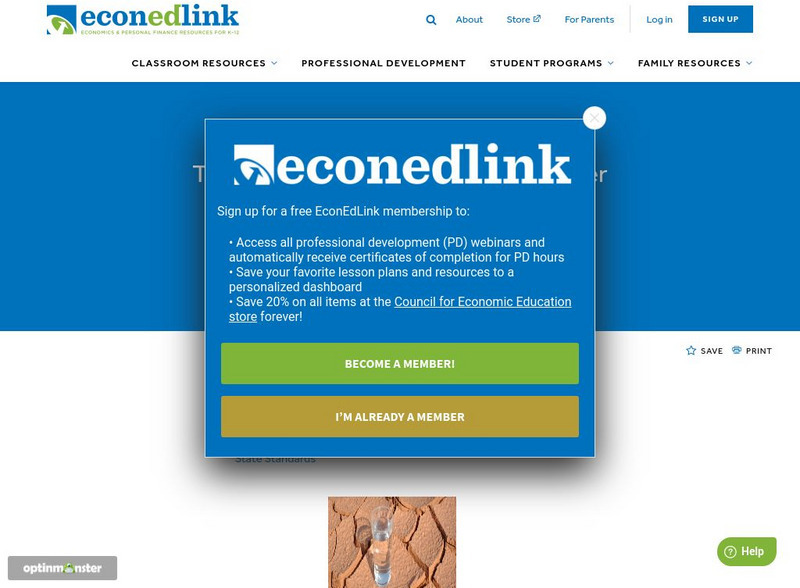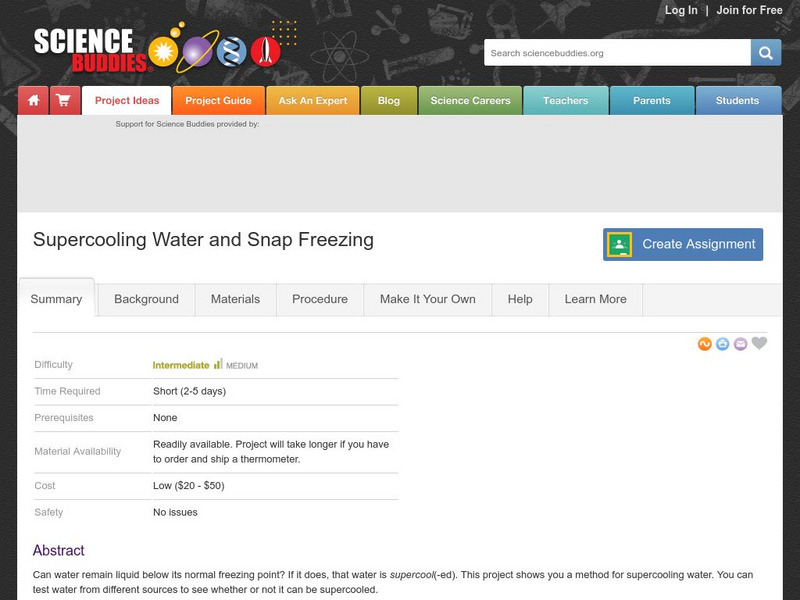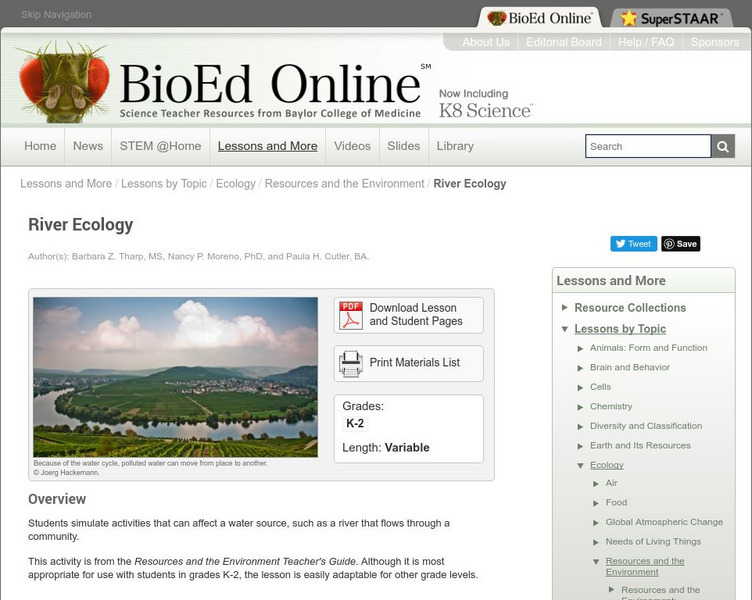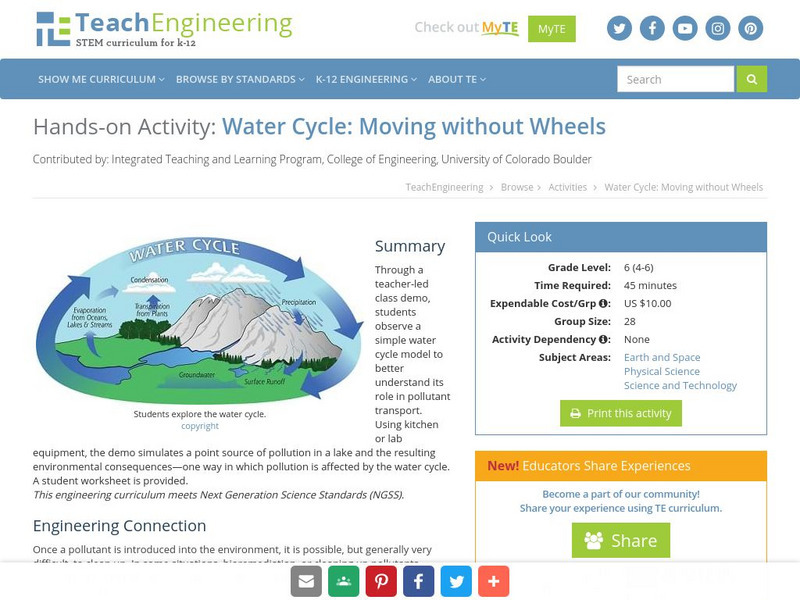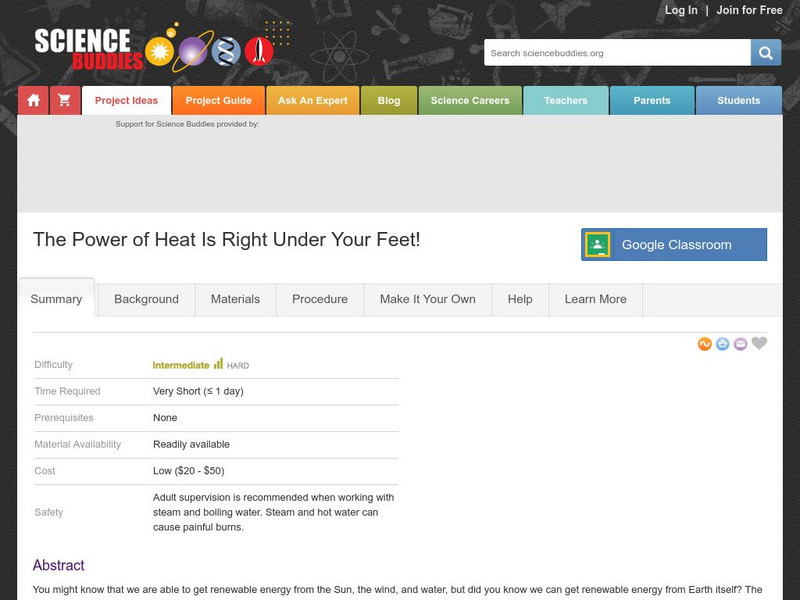CK-12 Foundation
Ck 12: Earth Science: Water Pollution
[Free Registration/Login may be required to access all resource tools.] Describes the sources of water pollution, such as municipal, industrial, and agricultural.
Idaho State University
Idaho State University: Surface Water Process, Supply and Use
This environmental geology resource identifies the significance of our land's surface water. Review the sources of water and how they are processed and used.
Utah Education Network
Uen: A Drop in the Bucket: Usu Water Cycle
Learn about the different sources of fresh water.
Utah Education Network
Uen: Water World Story
Fourth graders will write a story about how a drop of water may have traveled to arrive at the school.
CK-12 Foundation
Ck 12: Life Science: 12.27 Water Pollution
Understand water as a limited resource, and how it becomes polluted.
Council for Economic Education
Econ Ed Link: Ncee: Tapped Dry: How Do You Solve a Water Shortage?
Water is a limited and sometimes scarce resource. What do you do when the supply is limited?
US Geological Survey
Earth's Water: Rivers and Streams
The USGS explains the definition of a river and how a river is supplied with water. Included is a cross section of a river. Click Home to access the site in Spanish.
Science Buddies
Science Buddies: Supercooling Water and Snap Freezing
Can water remain liquid below its normal freezing point? If it does, that water is supercool(-ed). This project shows you a method for supercooling water. You can test water from different sources to see whether or not it can be...
TeachEngineering
Teach Engineering: What Happened to the Water? Designing Ways to Get and Clean
In this scenario-based activity, students design ways to either clean a water source or find a new water source, depending on given hypothetical family scenarios. They act as engineers to draw and write about what they could do to...
PBS
Pbs Learning Media: The Water Planet
75% of our earth is covered by water. Water can be found in oceans, lakes, rivers, groundwater, and sea ice. View these captivating photos of our earth showing the different water sources and images of our earth taken by NASA. Background...
US Department of Energy
U.s. Department of Energy: Water Power Program: Types of Hydropower Plants
Learn about the three types of hydroelectric power plants used to capture the energy from water at a hydropower dam site.
US Geological Survey
Lake Pontchartrain Basin Foundation: Liquid Assets: Our Water Resources
Lessons designed to show students how water quality, water pollution, and personal lifestyle are related. Lessons help students understand the importance of our water resources and water quality. Students will explore the nonpoint and...
BioEd Online
Bio Ed Online: River Ecology
In this lesson plan students are required to simulate activities that can affect a water source, such a river as it flows from one place to another within a community.
American Geosciences Institute
American Geosciences Institute: Earth Science Week: Identifying Your Watershed
Students identify the watershed they live in and study the pathway of surface runoff which ultimately becomes the source of water used at home,
The Franklin Institute
The Franklin Institute Online: Slick Sea Spills
Use this site to promote environmental awareness in your classroom with this lesson on the effects of oil spills on water habitats.
TeachEngineering
Teach Engineering: Moving Without Wheels
In a class demonstration, students observe a simple water cycle model to better understand its role in pollutant transport. This activity shows one way in which pollution is affected by the water cycle; it simulates a point source of...
Science Buddies
Science Buddies: The Power of Heat Is Right Under Your Feet!
You might know that we are able to get free energy from the Sun, the wind, and water, but we can also get free energy from Earth itself. This source of energy is called geothermal energy and it is all about taking advantage of the heat...
Science Buddies
Science Buddies: Cold Room? Heat It Up With a Homemade Solar Air Heater
Humans need food, water, and warm shelter to survive. But a lot of humans depend on fossil fuels to supply gas and electricity to heat our homes. But burning fossil fuels to create energy is harmful to the environment. In this science...
Science Buddies
Science Buddies: Waste Not, Want Not: Use the Microbial Fuel Cell to Create Elec
Gross. What is that in the toilet? But maybe it's not just gross. Did you know there are bacteria that digest organic waste and create electrons? What if there was a way to collect those electrons to power a circuit? In this science fair...
TeachEngineering
Teach Engineering: Rolling Blackouts & Environmental Impact
The goal is for the students to understand the environmental design considerations required when generating electricity. The electric power that we use every day at home and work is generated by a variety of power plants. Power plants...
The Wonder of Science
The Wonder of Science: K Ess3 3: Environmental Solutions
This NSTA vetted source includes resources to teach ideas on reducing the impact of humans on the environment. Included are assessment ideas, videos, examples, lesson plans, and photos of student work.
NOAA
Noaa: It All Runs Down Hill [Pdf]
Read how freshwater moving across the surface of the Earth can become polluted and bad for the environment. Create a model that shows how water can become polluted as it flows downhill.
PBS
Pbs Teachers: Scientific American: Future Car: Fuel Cells
Investigate the innovations surrounding fuel cell technology and the potential use of hydrogen as an automobile power source. Generate hydrogen gas by splitting water in a process called electrolysis.
American Geosciences Institute
American Geosciences Institute: Earth Science Week: Properties of Fluids in Reservoirs
This investigation will help students understand the physical relationships between natural gas, oil, and water in a reservoir and how these relationships can affect recovery.
Other popular searches
- Water Sources
- Sources of Water Pollution
- Water Sources Grades K 2
- Water Sources K 2
- Activities on Water Sources
- Natural Water Sources
- Water Sources in Qatar
- Types of Water Sources
- Landforms Water Sources
- Streams as Water Sources
- Natural Sources of Water
- Water Sources in Drought



